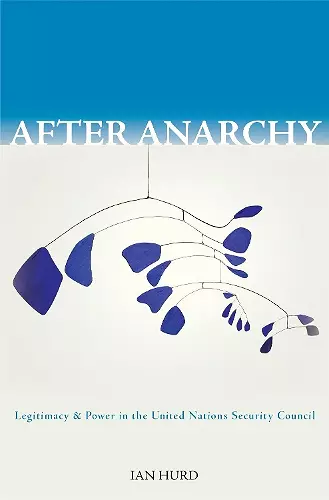After Anarchy
Legitimacy and Power in the United Nations Security Council
Format:Paperback
Publisher:Princeton University Press
Published:8th Jul '08
Should be back in stock very soon

This is an important book on an extremely important topic. In clear and engaging prose, Hurd examines legitimacy's role in shaping politics in a premier political forum--the United Nations Security Council. He shows us how legitimacy works on the ground in UN politics and the ways it has changed both the UN and world affairs. Hurd has a good nose for theoretical puzzles and is both creative and fearless about following through the implications of what he uncovers. -- Martha Finnemore, author of" The Purpose of Intervention" Ian Hurd's book is informative and insightful, scholarly in its treatment of the subject, and significant in its conclusions. It is the best study that I know of how norms of legitimacy work in international institutions. -- Michael Doyle, Columbia University Hurd's book is remarkable: concise, crisp, substantively compelling, serene in tone, generous in argument and ... jargon-free... Strongly recommended both for teaching and for the expansion of personal horizons on these important issues. -- David M. Malone, author of The "International Struggle over Iraq"
The politics of legitimacy is central to international relations. When states perceive an international organization as legitimate, they defer to it, associate themselves with it, and invoke its symbols. Examining the United Nations Security Council, this book demonstrates how legitimacy is created, used, and contested in international relations.The politics of legitimacy is central to international relations. When states perceive an international organization as legitimate, they defer to it, associate themselves with it, and invoke its symbols. Examining the United Nations Security Council, Ian Hurd demonstrates how legitimacy is created, used, and contested in international relations. The Council's authority depends on its legitimacy, and therefore its legitimation and delegitimation are of the highest importance to states. Through an examination of the politics of the Security Council, including the Iraq invasion and the negotiating history of the United Nations Charter, Hurd shows that when states use the Council's legitimacy for their own purposes, they reaffirm its stature and find themselves contributing to its authority. Case studies of the Libyan sanctions, peacekeeping efforts, and the symbolic politics of the Council demonstrate how the legitimacy of the Council shapes world politics and how legitimated authority can be transferred from states to international organizations. With authority shared between states and other institutions, the interstate system is not a realm of anarchy. Sovereignty is distributed among institutions that have power because they are perceived as legitimate. This book's innovative approach to international organizations and international relations theory lends new insight into interactions between sovereign states and the United Nations, and between legitimacy and the exercise of power in international relations.
Winner of the 2008 Chadwick F. Alger Prize, International Studies Association "Scholars do not fully understand the sources of legitimacy in world affairs or how it shapes and constrains what leaders do, but this book provides important insights by looking closely at one particular site of international authority: the United Nations Security Council."--G. John Ikenberry, Foreign Affairs "Hurd explores the intricate relationship between legitimacy and authority in world politics through an empirical study of the UN Security Council. He provides readers a most thoughtful discussion of the concept of legitimacy, explaining what it is, what it is not, and how it is exercised in world politics."--J.R. Strand, Choice "Ian Hurd's new book provides a vital contribution to the discussion with a well-specified model of legitimacy that balances a subjective, psychological definition with a structural account of legitimacy's effects."--C. Cora True-Frost, Political Science Quarterly "The book succeeds in its main theoretical objective, which is to show how constructivism and rational choice can be complementary. As such, it is essential reading for those who seek a more nuanced understanding of how social facts work in international politics."--Jennifer M. Welsh, International History Review "[T]his highly sophisticated analysis adds greatly to the literature in this field."--Aidan Hehir, European Legacy "Ian Hurd has made an important contribution ot the discourse on international relations with his book."--Patrick Kubart, Journal of International Law of Peace and Armed Conflict
- Winner of ISA International Organisation Section Chadwick F. Alger Prize 2008
ISBN: 9780691138343
Dimensions: unknown
Weight: 340g
234 pages